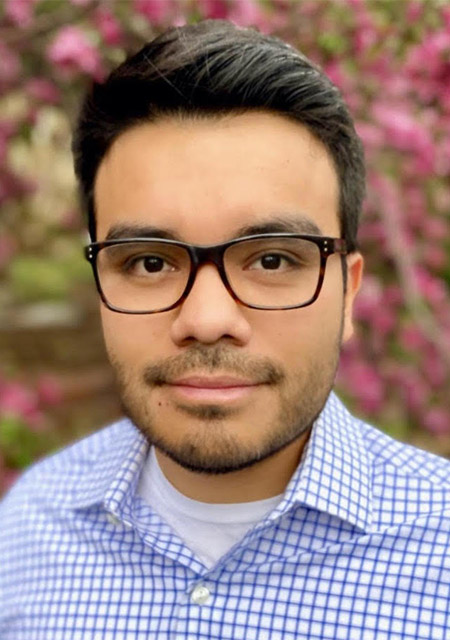Dean's Research Associate: Rene Crespin
January 25, 2023 - Katie Nicpon
 The MSU Department of Economics welcomes Dr. Rene Crespin as their new College of Social Science Dean’s Research Associate. Dr. Crespin is an applied microeconomist who earned his PhD from Cornell University this past summer. His first encounter with MSU was as a Teaching Fellow with the American Economic Association’s Summer program (AEASP) when it was hosted by MSU, which gave him an opportunity to meet professors from the department.
The MSU Department of Economics welcomes Dr. Rene Crespin as their new College of Social Science Dean’s Research Associate. Dr. Crespin is an applied microeconomist who earned his PhD from Cornell University this past summer. His first encounter with MSU was as a Teaching Fellow with the American Economic Association’s Summer program (AEASP) when it was hosted by MSU, which gave him an opportunity to meet professors from the department.
“Through this experience, I saw how committed MSU professors involved with AEASP were in making sure that undergraduate students from underrepresented backgrounds felt welcomed and valued for their perspectives. The Dean’s Research Associate program will provide me with the opportunity to contribute to creating a diverse, equitable, and inclusive environment and advance my research and teaching.”
Dr. Crespin’s research interests lie at the intersection of education, public and labor economics. He has developed a research portfolio focused on applying tools of causal inference and data science to examine levers that lessen or exacerbate inequality, such as education and immigration policies.
“Currently, in my main line of research, I study the intended/unintended consequences of education policies on students’ school choice and families’ residential decisions,” he said. “In my research, I find inequality in families’ abilities to respond to educational policies,which can further perpetuate inequality. For example, a school district having a school choice policy doesn’t necessarily mean that everyone has equal ability to access the potential school choice benefits.”
Dr. Crespin says that he grew up in the south side of Chicago with parents who immigrated from El Salvador during the Civil War, which forms the basis for why he’s so interested in his research.
“Going through the Chicago Public Schools district, I navigated a system where your school options seemed to be decided for you based on where you lived, with a few outside school options that seemed difficult/impossible to gain access to,” he said. “With the help of passionate teachers, I made it through the system and went to college at the University of Chicago. Being a first-generation college student, I started realizing how unequal the educational system in Chicago and in many parts of the US can be—my pre-collegiate educational experience was atypical at UChicago.”
In the second line of his research, he studies the effects of immigration enforcement policies on undocumented immigrants’ and their families’ willingness to invest in their local economies through housing, consumption, and work, as well as the spillover effects of these policies.
“I’ve seen many neighbors, classmates, and family members face these types of economic decisions,” he said. “Many of these experiences inspired much of my research.”
He explains that this research is important because we don’t know very much about the causal effects of these education and immigration policies, and yet there can be massive repercussions to changing or keeping policies in place on school and neighborhood segregation, inequality, and mobility.
“I hope to keep making progress on this line of work and hope to make a useful impact on the economics literature and a positive impact on policymakers as they think about the intended and unintended consequences of their policies,” he said.
Dr. Crespin also is teaching the Economics of Education undergraduate course this semester. He enjoys teaching the theory and application behind a lot of the main topics in the Economics of Education, which allows him to think about education topics outside his research and make new connections across so many different topics.
“The second thing I enjoy about teaching this course is that I get to teach it in a way that I hope is more interesting to my students, with relevant examples between the theory, applications, and relevance to their life experiences or current events they see on the news.”
In his course, he emphasizes how useful the theory behind the models is, the limitations of these models in the real world, the applicability of the models to modern questions, and their policy relevance.
“Importantly, I emphasize that even though there has been so much progress in the Economics of Education, our knowledge about a lot of topics in this field is still very limited,” he said. “So after they graduate, I want my students to be able to acknowledge that we have useful knowledge, but that we don’t know everything and should stay humble around this fact. If they pursue careers in industry, government, or other sectors, they should stay curious about the possibility of finding new ways to improve on the past. And if they become researchers, that there are still many open questions, which hopefully is exciting to them.”
Since moving to East Lansing and joining MSU, Professor Crespin has enjoyed getting coffee with his new colleagues.
“We’re delighted that Dr. Crespin has joined our department and the important perspectives and dynamic research he brings,” Professor Steven Haider said, chair of the department.
When asked about his interests outside of academia, he shared that he enjoys exploring and hiking the outdoors in Michigan .
To learn more about Dr. Crespin, visit http://econ.msu.edu/faculty/crespin/index.php.

